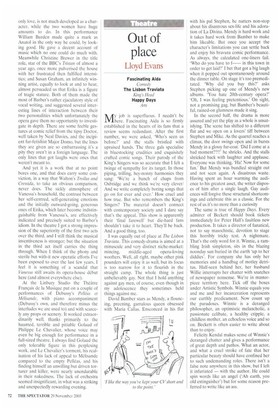Out of Place
Lloyd Evans
Fascinating Aida Comedy The Lisbon Traviata King's Head Happy Days Arts My job is superfluous. I needn't be here, Fascinating Aida is so firmly established in the hearts of its fans that a review seems redundant. After the first number, we were asked, 'Who's seen us before?' and the stalls bristled with upraised hands. The three gals specialise in bluestocking crudities and exquisitely crafted comic songs. Their parody of the King's Singers was so accurate that I felt a twinge of sympathy for its target. in those piping, trilling, hey-nonny harmonies they sang: 'We're a bunch of chaps from Oxbridge and we think we're very clever/ And we write completely boring songs that go on for ever and ever.' How cruel and how true. But who remembers the King's Singers? The material doesn't connect with contemporary society and I dare say that's the appeal. This show is apparently their 'final farewell' but die-hard fans shouldn't take it to heart. They'll be back. And a good thing. too.
I was equally out of place at The Lisbon Traviata. This comedy-drama is aimed at a minuscule and very distinct niche-market: mincing, middle-aged opera-loving woofters. Well, all right, maybe other pink pounders will enjoy it as well, but its focus is too narrow for it to flourish in the straight camp. The whole thing is just unbelievably gay. Not that I hold anything against gay men, of course, even though in my adolescence they sometimes held things against me.
David Bamber stars as Mendy, a flouncing, preening, garrulous queen obsessed with Maria Callas. Ensconced in his flat with his pal Stephen, he natters non-stop about his disastrous sex-life and his adoration of La Divina. Mendy is hard work and it takes hard work from Bamber to make him likeable. But once you accept the character's limitations you can settle back and enjoy his bravura comic performance. As always, the calculated one-liners fail.
'Who do you have to f in this town in order to get laid?' J bet that got a big laugh when it popped out spontaneously around the dinner table. On stage it's too premeditated. 'Why did you buy this?' asks Stephen picking up one of Mendy's new albums. 'You hate 20th-century opera?' 'Oh, I was feeling pretentious.' On sight, not a promising gag, but Bamber's beautiful, rained-on glumness made it sing.
In the second half, the drama is more assured and yet the play as a whole is unsatisfying. The scene has shifted to a different flat and we open on a lovers' tiff between Stephen and Mike. As the quarrel reaches a climax, the door swings open and in bursts Mendy in a glossy fur-coat. 'Did I come at a bad moment???!' he shrieks. And the stalls shrieked back with laughter and applause. Everyone was thinking, 'Hat Now for some fun.' But Mendy was bundled straight out and not seen again. A disastrous waste. Having spent an hour warming the audience to his greatest asset, the writer disposes of him after a single laugh. Gay audiences will forgive these structural shortcomings and celebrate this as a classic. For the rest of us it's no more than a curiosity
The same is true of Happy Days. Every admirer of Beckett should book tickets immediately for Peter Hall's faultless new production. It takes a director of fanatical, not to say masochistic, devotion to stage this horribly tricky text. A nightmare. That's the only word for it. Winnie, a rambling Irish simpleton, sits in the blazing noonday sun buried in the earth 'up to her diddles'. For company she has only her memories and a handbag of motley detritus. Half-seen behind her, her husband Willie interrupts her chatter with snatches of newspaper nonsense. We're in masterpiece territory here. Tick off the boxes under Artistic Symbols. Winnie equals you and me and her incarceration represents our earthly predicament. Now count up the paradoxes. Winnie is a deranged philosopher, an optimistic melancholic, a passionate celibate, a healthy cripple, a childless mother, an echoeless voice and so on. Beckett is often easier to write about than to enjoy.
Felicity Kendal makes sense of Winnie's deranged chatter and gives a performance of great depth and pathos. What an actor, and what a cruel stroke of fate that her particular beauty should have confined her to such undemanding roles. There isn't a false note anywhere in this show, but I left it infuriated — with the author. He could spin words like an angel ('Ah earth, you old extinguisher') but for some reason preferred to write like an ass.


























































































 Previous page
Previous page